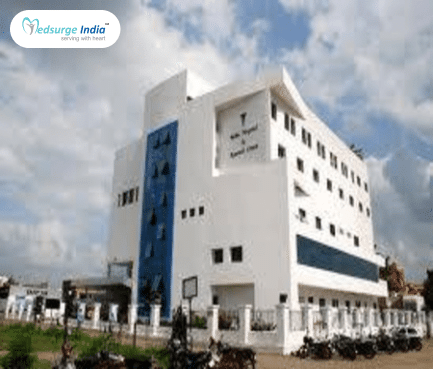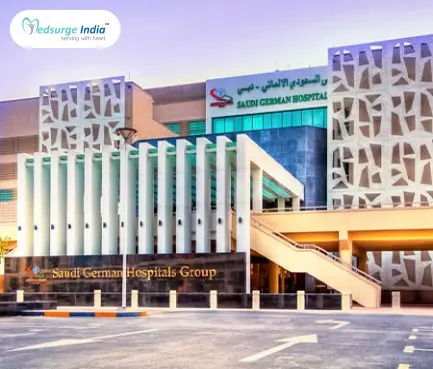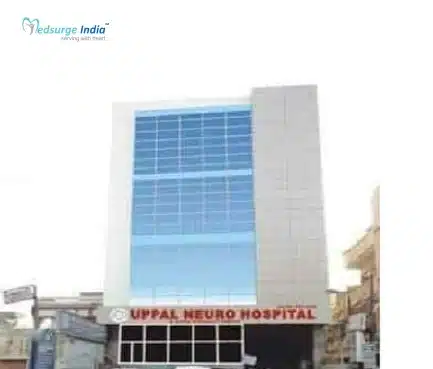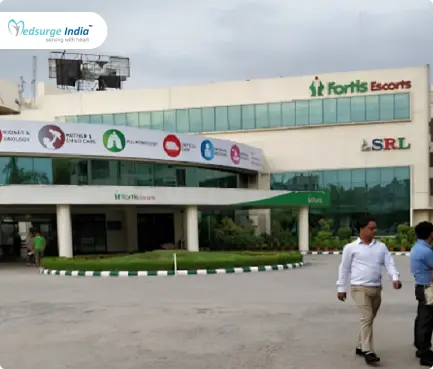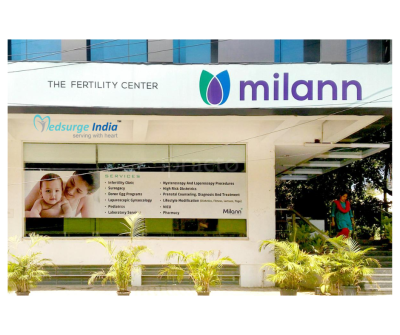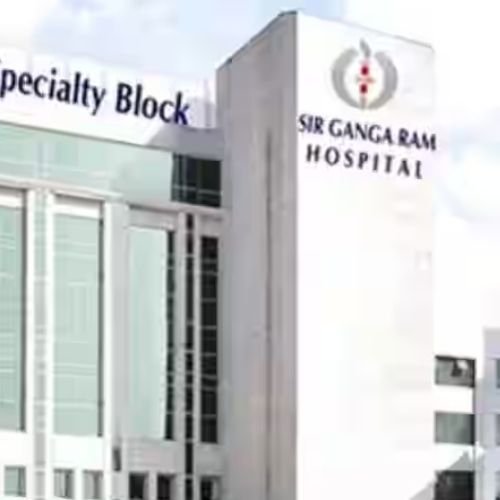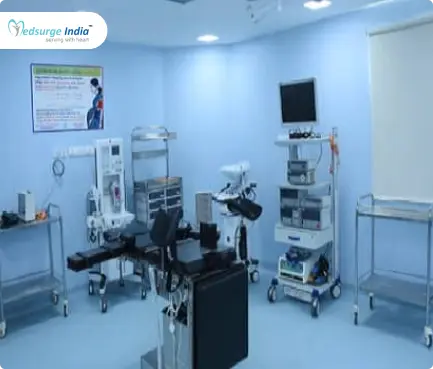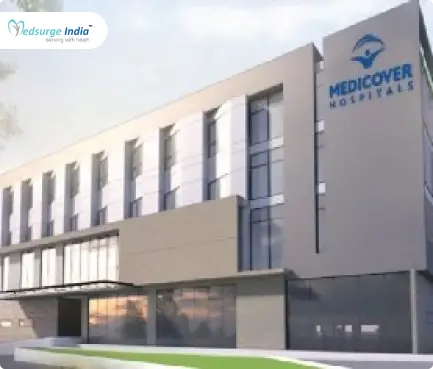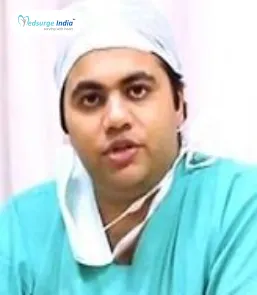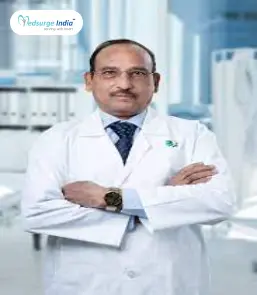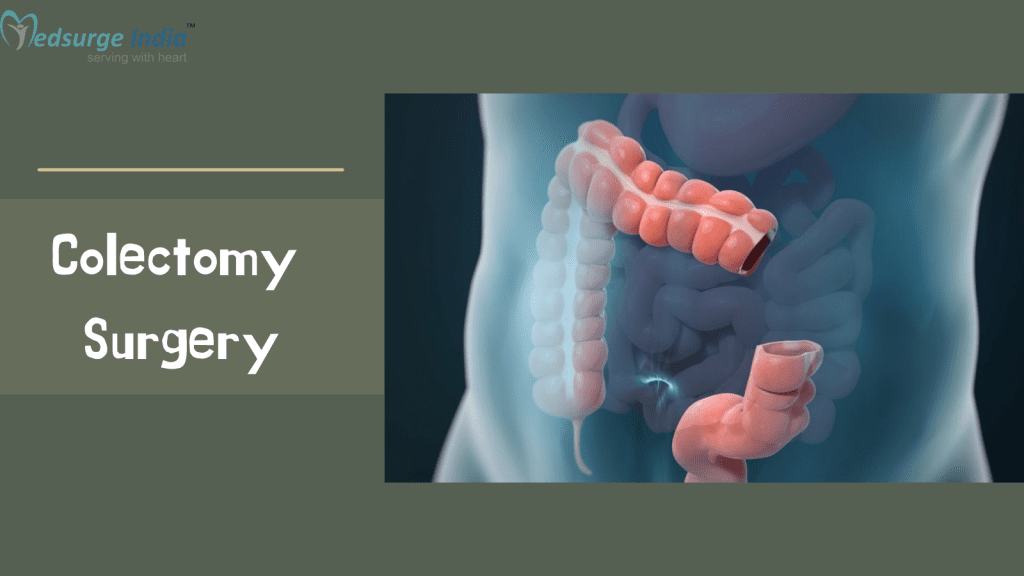
A colectomy is a surgical procedure to remove the colon completely or in part. The large intestine refers to the colon. It is a large, hollow organ that is present at the end of the digestive tract. Colectomy is suggested to cure and prevent many conditions or diseases affecting the colon or large intestine. A colectomy surgery in India is done in 2 ways: open colectomy and laparoscopic-assisted colectomy. The best doctor to consult for a colectomy is a colorectal surgeon with surgical procedure experience.
A colectomy surgery cost in India is affordable as compared to other countries. The patient must spend seven days in the hospital and another 21 days out of it. The patient’s diagnosis and the facilities they choose will influence the overall cost of the treatment.
What Is Colectomy?
A colectomy surgery in India is a procedure used to remove all or a portion of the colon. Another name for it is a large bowel resection. After a colectomy, a colostomy may occasionally be required. A colostomy is a bodily opening that allows stool (bowel movements) to leave the body and go into a bag. In some circumstances, the severed portions of the colon will be stitched back together to allow for bowel movements without the need for a colostomy.
Know More – Irritable Bowel Syndrome Treatment Cost in India
Types of Colectomy Surgery:
- Total Colectomy: It is a type of colectomy in which the patient’s entire colon is removed from the body.
- Partial colectomy: Only the affected area of the colon is removed during this type of colectomy treatment. This procedure is often called a subtotal colectomy.
- Hemicolectomy: The either right or left portion of the colon is removed during this type of colectomy surgery.
- Abdominal Perineal Resection: Removal of the rectum, anus, and sigmoid colon (a portion of the colon that joins to the rectum). After this procedure, a colostomy will always be required.
- Segmental Resection: In this procedure, a small portion of the damaged colon is removed.
- Low Anterior Resection: The uppermost portion of the rectum is removed.
- Sigmoidectomy: Removal of the lowest part of the colon.
Colectomy Surgery Cost In India
The average Colectomy Surgery Cost in India starts from USD 7,000. However, the specific method your surgeon uses to carry out the procedure will determine the cost of your colectomy surgery in India.
Prices Depending on The Type of Cities in India
| Cities | Starting Prices |
| Delhi | USD 7000 |
| Noida | USD 7100 |
| Gurgaon | USD 7200 |
| Bangalore | USD 7400 |
| Chennai | USD 7000 |
| Kolkata | USD 7000 |
| Mumbai | USD 7200 |
| Hyderabad | USD 7100 |
Note that the prices for the treatment will also depend on various factors.
Prices Depending On The Type of Treatment:
| Treatment | Starting Price |
| Open colectomy | USD 7100 |
| Laparoscopic colectomy | USD 7200 |
Factors That Can Affect Colectomy Surgery Cost in India
In terms of quality and standard, the level of medical care and services is comparable to that of the best hospitals in the world. Even after accounting for travel, hotel, and food expenses. Here are some variables that can affect Colectomy Surgery cost in India:
- Hospital reputation and infrastructure.
- The expertise and experience of medical professionals.
- The type and frequency of diagnostic procedures.
- The choice of treatment modality.
- Medication costs.
- Duration of treatment.
- Geographical location.
- Hospitalization expenses.
- Government policies and subsidies.
- Medical tourism packages.
By being aware of these variables, patients and medical professionals can successfully negotiate and make choices that suit their requirements and preferences.
A colectomy may be used to treat:
- Colon cancers.
- Malignant polyps.
- Colectomy may prevent colon cancer in situations where the mutation is inherited genetically
- Intestine obstruction (a blockage).
- Bleeding or infection.
- Diverticulitis.
- Crohn’s disease.
- Volvulus (twisted intestines).
- Inflammatory colitis
- Intussusception (when the intestine folds into itself).
The remaining digestive tract is joined together to remove waste from the body following a colectomy surgery. This further involves another surgical procedure.
Get Free Cost Estimation
Procedure
How to Prepare for the Procedure?
The patient and doctor will have a detailed conversation about the colectomy procedure, including its benefits and risks. Some points to be taken into consideration are as mentioned:
Colectomy Surgery In India
- Before starting colectomy surgery in India the patient’s vital signs are examined by the respected doctor. A pulse oximeter is used to measure the blood’s oxygen content and pulse rate. The patient is given a blood pressure cuff to wear on their arm to measure their blood pressure. The patient is subsequently administered an antibiotic through an arm vein.
- After that, the patient is taken into the operating room. To keep the patient from experiencing any pain during the procedure, general anesthesia is administered. A breathing tube may be inserted into the patient’s mouth while they are asleep and connected to the ventilator on the other end. This helps the patient to breathe normally during and even after the surgery (for some time).
Thereafter, there are two ways to carry out the colectomy process, as described below:
- Open colectomy: To access the colon during this treatment, a sizable incision is created on the patient’s belly. Depending on the severity of the issue, the surgeon will subsequently use specialized surgical equipment to cut the afflicted area or the entire colon.
- Laparoscopic colectomy: With the help of a tiny camera called a laparoscope, it is carried out through a number of small incisions. Your surgeon will start a laparoscopic or robotic colectomy by making a single, tiny incision to insert the laparoscope. They will put the camera, which will display your organs on a video screen, after pumping gas through the incision to expand your abdominal cavity for better sight. Your surgeon will be able to access your colon with specialized tools through one or more minor incisions.
After The Procedure
- The patient is moved to the recovery room following surgery, where he or she is constantly checked over and observed. The vital indicators, such as heart rate, oxygen saturation or breathing rate, body temperature, and pulse rate, are continuously tracked.
- Until the patient’s condition is entirely stabilized and he can breathe on his own, he will need to stay on the ventilator for a while. Once the patient’s bowel movements return and no complications arise, the patient is typically released.
- The patient can’t digest solid food at first, so the doctors recommend a liquid diet administered intravenously (IV). The patient would be instructed to begin consuming drinks slowly.
- The patient can adequately digest solid meals if the intestine has fully recovered.
- Due to the weakness, it would be challenging for the patient to resume normal activities for a few weeks. However eventually, the patient can return to the workplace after consulting the doctor.
- Due to the weakness, it would be challenging for the patient to resume normal activities for a few weeks. However eventually, the patient can return to the workplace after consulting the doctor.
- When waste is excreted through an abdominal opening, the nurse explains how to appropriately care for the waste bag (ostomy bag) at home.
Read More – Intestine Transplant Cost in India
What Are the Risks of Having Colectomy?
There are risks and potential side effects with any procedure. These include:
- Reaction to anesthesia (Anesthesia is the name of the drug that is given to you before surgery to make you sleep through it, make you forget it, and manage your pain. Wheezing, redness, swelling, and low blood pressure are among the reactions that can occur).
- Bleeding.
- clots of blood.
- Infection.
- Damage to surrounding organs such as the small intestine, ureter, blood arteries, and/or bladder.
- Surgical hernia (This occurs when abdominal tissue pulls through a muscle. When touched, it may feel uncomfortable or tender and resemble a bump.
- Adhesion and scar tissue development
- Opening or disintegrating of your incision.
- Your colostomy is having problems, including being infected or leaking.
- Intestine obstruction (A blockage in the bowel).
- Leaks at the joints (A leak in the area reconnecting the bowel and fluid leaks into the body).
How Recovery Is Done?
The extent of the colectomy will determine how long it takes for you to recover. The type of surgery you underwent and the duration of time required for recovery will determine how long you must stay in the hospital.
Before leaving the hospital, you will receive any additional instructions as well as information on how to take care of your surgical incisions and stoma (if applicable). A specially trained stoma nurse or therapist will provide you with complete advice on how to care for the stoma (if present).
Your medical team will go over the drugs you’ll be taking with you, including those for pain management, blood clot prevention, infection control, constipation prevention, and/or other diseases.
Suggestion
Colectomy is a big procedure, but it is generally secure and efficient. It can be easier than you think to return to your regular habits thanks to recent medical advancements. Get in touch with your provider if you’re worried about requiring an ostomy. Any queries or worries you may have regarding the possible effects an ostomy bag may have on your life can be addressed by them. Perhaps you won’t even require one. If you do, however, you should be aware that it’s not necessary for you to be unable to lead a full, active, and happy life because of your colostomy bag.
The Most Important Frequently Asked Questions
Q: Is Colectomy a Major Surgery?
A: A colectomy is a big procedure that takes a long time to recover from, although most patients are totally recovered and able to return to their regular activities within a few months. This simple summary of the digestive system may be useful to better comprehend the requirement for a colectomy: Your stomach is where the food you eat ends up.
Q: What Are the Side Effects of a Colectomy?
A: Diet Following Colectomy. Bowel issues can develop after having a piece of your colon removed. Dehydration, diarrhea, constipation, and excessive gas production are the most typical issues. These symptoms appear because the colon’s usual processes—like absorbing fluid—have not yet fully recovered.
Q: Is Colectomy a High Risk Surgery?
A: There is a chance of severe consequences after a colectomy. Your overall health, the type of colectomy you have, and the technique your surgeon employs during the procedure all influence your risk of problems. Bleeding is one example of a colectomy complication.
Q: How Does a Colectomy Recovery Go?
A: A total colectomy is a complex procedure that typically necessitates a hospital stay of three to seven days. The physicians and nurses will be working hard to make your loved one comfortable during this period, keep an eye out for any issues, and gradually reintroduce food and movement.
Q: How Long Is It Possible to Go Without a Colon?
A: The fundamental function of the large intestine or colon is to concentrate the stool by absorbing water and electrolytes. People can live full lives without their large intestine because it has a little role in metabolism.
Top Hospitals for Colectomy Surgery In India
Top Doctors for Oncology and Oncosurgery
Dr. Karthik K S
Senior Consultant
Experience: 16+ years of experience
KMC Hospital, Hampankatta, Mangaluru
Mangaluru, India
Dr. Arun Kumar Giri
Consultant
Experience: 19 years of experience
Venkateshwar Hospital, New Delhi
New Delhi, India
Dr. Sundaram Pillai
Consultant
Experience: 12 years of experience
Reliance Hospital, Navi Mumbai
Mumbai, India
Dr. Monika Pansari
Consultant
Experience: 15 years of experience
BGS Gleneagles Global Hospitals, Bangalore
Bangalore, India
Dr. P. Dhanasekar
Consultant
Experience: 19 years of experience
Apollo Cancer Hospital, Chennai
Chennai, India
Dr. Sharadwat Mukherjee
Consultant
Experience: 11 years of experience
AMRI Hospital, Kolkata (Dhakuria)
Kolkata, India
Dr. B Krishnamoorthy Reddy
Senior Consultant
Experience: 30 years of experience
Apollo Hospital Bangalore Bannerghatta Road
Bangalore, India
Dr. Kundan Singh Chufal
Consultant
Experience: 17 years of experience
Rajiv Gandhi Cancer Institute and Research Centre, New Delhi
New Delhi, India
Dr. Nagraj Gururaj Huilgol
Consultant
Experience: 43 years of experience
Nanavati Super Specialty Hospital Mumbai
Mumbai, India
Dr. Rushabh Kothari
Senior Consultant
Experience: 14+ years of experience
Narayana Multispeciality Hospital, Rakhial, Ahmedabad
Ahmedabad, India




